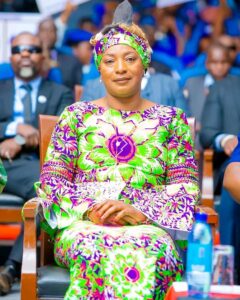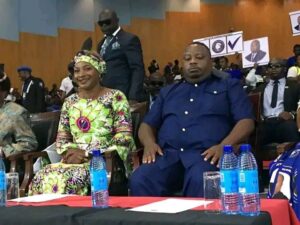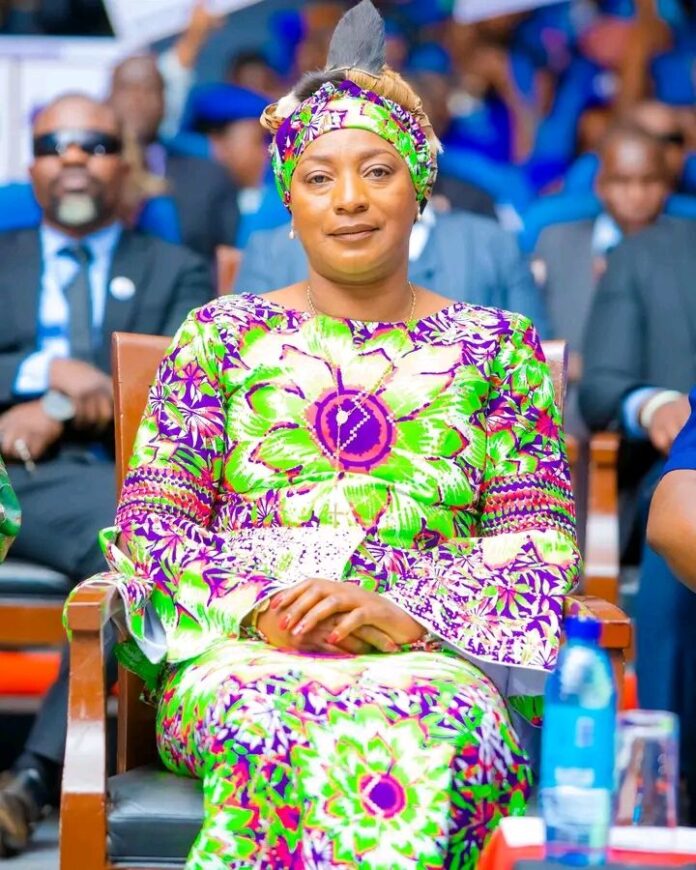By Jones Gadama
The political landscape within the People’s Democratic Party (PDP) has taken a dramatic turn following the recent announcement that Bertha Mackenzie Ndebele, newly unveiled as Kondwani Nankhumwa’s running mate, will contest the Balaka South constituency as an independent candidate rather than under the PDP banner.
This development has stirred considerable debate and speculation, signaling deeper fractures within the party and raising questions about Nankhumwa’s leadership and his ability to unify his political base.
On Saturday, during the formal presentation of nomination papers to the Malawi Electoral Commission, Nankhumwa introduced Ndebele as his running mate.
However, the expectation that Ndebele would contest under the PDP was quickly dispelled when it was revealed she would stand independently in Balaka South.
This move has been widely interpreted by political observers and commentators as a glaring sign of internal discord and a lack of confidence in Nankhumwa’s capacity to rally his key supporters.

The decision by Ndebele to run as an independent candidate rather than as a PDP member is not just a procedural anomaly; it is a clear political statement. It suggests that even those closest to Nankhumwa may be hedging their bets or distancing themselves from the party’s official platform, possibly due to disagreements over strategy, leadership style, or ideological direction.
This raises concerns about the coherence and discipline within PDP ranks, especially as the party gears up for critical elections.
Many analysts view this episode as an exposure of Nankhumwa’s political immaturity. Leadership in politics demands more than just the ability to secure positions—it requires the capacity to inspire trust, manage competing interests, and maintain party unity.
The fact that a running mate feels compelled to break ranks at such a crucial moment indicates cracks in Nankhumwa’s leadership approach. It also reflects poorly on his political acumen, suggesting a failure to build the necessary consensus or to effectively engage with his closest allies.
The implications of Ndebele’s independent candidacy extend beyond internal party politics. For the electorate, this situation may sow confusion and dilute the PDP’s strength in Balaka South, a constituency that could be pivotal in determining the party’s overall performance.
Voters loyal to PDP may find themselves divided, with some supporting the official party candidate and others drawn to Ndebele’s independent bid.
Such fragmentation often benefits rival parties, potentially weakening PDP’s position in the larger political contest.
Moreover, the move could signal a broader trend of disillusionment within the party’s grassroots.
If prominent figures like Ndebele feel sidelined or compelled to chart their own course, it raises questions about the party’s inclusivity and responsiveness to its members’ aspirations.
This kind of internal dissent often reflects underlying tensions that, if left unaddressed, can lead to further defections, erosion of support, and ultimately, electoral defeat.
Political maturity also entails managing public perception.
The optics of unveiling a running mate only to have her run independently undermines the message of unity and strength that political parties strive to project during election campaigns.
It may embolden opposition parties to exploit PDP’s vulnerabilities, framing their rivals as fragmented and unstable.
In the high-stakes environment of Malawian politics, where alliances and party cohesion are crucial, such perceptions can be costly.
Nankhumwa’s response to this development will be critical in shaping the future trajectory of PDP.
How he manages the fallout, addresses the concerns of his supporters, and attempts to rebuild trust will determine whether this episode is a temporary setback or the beginning of a more profound crisis.
Effective leadership requires acknowledging challenges openly, engaging in dialogue with dissenting voices, and demonstrating a willingness to adapt and reconcile differences.
Bertha Mackenzie Ndebele’s decision to contest Balaka South as an independent candidate amidst her recent unveiling as Kondwani Nankhumwa’s running mate exposes significant vulnerabilities within PDP.
It highlights issues of leadership credibility, party cohesion, and strategic clarity.
For Nankhumwa and PDP, this moment presents both a challenge and an opportunity: to either address internal fractures with maturity and inclusivity or to risk further erosion of their political capital and standing.
As the election season progresses, all eyes will be on how this political drama unfolds and what it ultimately means for the future of the party and Malawi’s political landscape.




